Inside
the
Winter Issue:
Season's
Spinnin'
Around Again
Behind the Song:
"We Are the World"
Ken
Kragen
Recalls Harry's
"Do Something" Motto
Relections
From
Harry's Mom:
An Interview with
Elspeth Hart
The
"Old Folkie"
is Still Singing,
Still Inspiring
The
Chapin Sisters
Head West; No Rush
to Strike Gold
Florida
Food Banks
Seek Support
After Extreme
Storm Season
Hey
Kids,
You Can Make
A Difference...
A
Photographer's
Perspective:
Harry in Concert
"Celebration
in Song"
Concert Helps Fuel
Fight Against Hunger
Click
to read
the Winter 2004 Issue
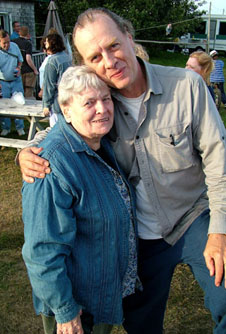 |
|
Elspeth
Hart and son Steve Chapin
Photo courtesy Tom Chapin |
Reflections
From Harry's Mom:
An Interview with Elspeth Hart
by Mike
Grayeb and Linda McCarty
In a recent interview, Elspeth Hart shared with Circle!
a mother’s perspective on Harry’s childhood and his development
and success as a singer-songwriter and social activist.
Harry used to talk about the artistic and intellectual
influences of his family and how important they were to him as a child
growing up. Can you tell us about some of the people in your family who
may have had an influence on him?
Well, his
two grandfathers were both unique. His grandfather Jim Chapin was an American
painter. I don't think he did any portraits of Harry at all, but he did
a portrait of me when I was pregnant with Stevie, and he did one of my
father.
My father, Kenneth Burke, was a literary critic and a writer. But Harry
grew up where it was assumed that men were creative, and there was not
an emphasis on making money or arriving in the business world or anything
like that. It was completely foreign to us.
You supported your family, but it wasn't what seems to be now the emphasis
on expensive cars and all that. It was a whole different emphasis. Somehow
the all-American theme seems different than it did when I was younger.
It was about making something or creating something or discovering truths.
My father had parties with literary friends like Malcolm Cowley. There's
a book of letters of Kenneth Burke and Malcolm Cowley. They had grown
up together in Pittsburgh and been in the village scene together. My father
K.B. and Jim Chapin met when my father was the editor of The Dial
magazine, and he published some of Jim's paintings. I remember Jim Sr.
from the time I was six. I was always very fond of him.
What were the summers like at the family home in
Andover, New Jersey, when your children were young?
We went out every summer, and originally, it was a house without plumbing.
In fact, we didn't put in plumbing until Harry made money and added a
wing, and we put in a furnace and running water and all that kind of stuff.
It was very much a primitive kind of place. Actually, when I was a child,
we carried in water from the spring. Later on, we had a pump on the back
porch where we could pump water, and we'd heat it on the stove. It was
quite simple living, but for the kids it was great because we didn't have
TV or anything and they played outside.
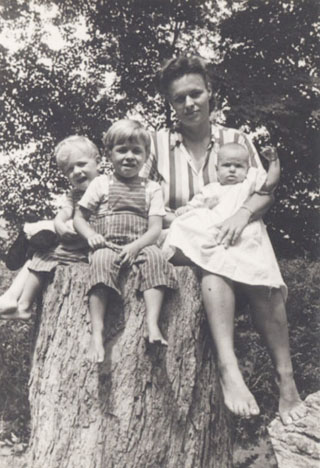 |
|
Elspeth
Hart with James, Harry and Tom Chapin
Photo courtesy of Josh Chapin |
We had a lake and they went barefoot in the summer months. The only things
you had to look out for were snakes and crossing the dirt road. There
were all kinds of games they could play. We had a tennis court, and Harry,
Tom and Steve played tennis. James was not as athletic.
I was working most of the time after Jim and I separated. So the kids
stayed there with my mother, and I'd come out there on weekends. My mother
was good at carpentry, and we added a wing to the house. She had the boys
help her saw wood and do things like that.
It's different out there now when I see my grandchildren come out, and
they're interested in tapes and television and cell phones and all these
other things. But, back then, there was none of that, so they were just
forced into their own games like Parcheesi and various things of the sort.
It was not too much different than when I grew up.
Please tell us about one of your father's songs,"One
Light In a Dark Valley," which Harry eventually recorded.
My father wrote it and the music for it on the piano, and Harry put it
on one of his albums. But it's been published in a book called "A
Book of Moments" with my father's poetry.
My father also has poem in the New Jersey Transit's new waiting room in
Penn Station. They put up poems from four New Jersey poets. So, of course,
they put up something from William Carlos Williams, but there's something
my father wrote there, too. He read and understood music and played a
lot of it when he was growing up -- sort of more classical and old-fashioned
things than modern music.
Did your father play music for the kids when they
were at Andover?
Well, we lived in different houses. There are different houses there.
I mean he was sort of an influence in the background. He was an odd man.
He was an only child. He loved having family around but he was not a great
'sit up on my knee' kind of a grandfather.
How much of an influence was Harry's other grandfather,
Jim Chapin?
He was never around as much. Jim, and Mary, who was his second wife, lived
out there for a couple of summers in Andover. Jim was an excellent athlete
- a very good tennis player. I think he actually fenced and boxed and
did all of that kind of thing, whereas my father was a small man who was
in very good shape, but he sawed wood and cut wood with an axe but never
played a lot of sports.
What kinds of paintings did Jim create?
There's one of a pretzel man. And [Harry's daughter] Jen's got a couple
that have people in street scenes from the village I think.
Jim lived for a while in a little area of New Jersey where there was an
old farm family named the Marvins, with two men and their sister. When
the men got drunk they would beat up their sister. The Montclair Museum
of Art has Jim's paintings of these farmers. Jim went and broke up the
brothers' still and they left. But the pictures are wonderful — men
around an old stove.
It's sort of like the Grant Woods kinds of paintings. Jim and Grant were
from the same generation and painted the same kinds of things.
And then he had a picture of a prize fight where the noble looking black
guy is being beaten up, and there is a shifty-looking man who is the manager
or something and obviously making money from the fight. Those were the
sorts of portraits he would paint.
What were some of the core values of your family,
and how were you able to teach those values to your children?
With the little boys, it was always consider each other, think before
you act -- all the obvious things. He's littler than you. Figure out what
he was really meaning to do. Take it slow.
I was actually brought up in a houseful of women. I had three sisters
and we weren't used to little boys. But there always was this thing about
considering the poor and not having the values of being greedy. All of
us had those values all along. I think raising boys is easier for a woman
alone than raising girls. They're more tolerant of their mother, I think.
Teenagers question mores and the way Harry questioned mores was going
into the Air Force Academy. I mean we were very anti-militaristic and
anti-war and everything else. He realized about ten minutes after he got
there what a mistake it was but it took him a while to get out. It was
a thing of trying something absolutely different than anything he was
brought up with.
Can you tell us about the relationship Harry had with his brothers?
Harry and James were very close. They were only 13 months apart, and they
sort of grew up together. When James was very young, he made up his own
language, and Harry and he spoke in their own language. They had a word
like "lalloo" for water. They were always close and when they
were really little they were inseparable.
On the musical side, Harry was closer to Tom and Steve. They were all
very close to each other.
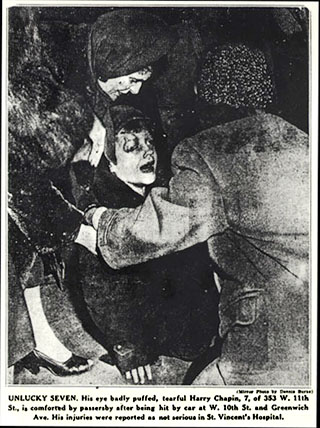 |
|
Newspaper
scan courtesy of Josh Chapin.
|
Is
it true that when Harry was a youngster, he actually had a run-in with
a taxi?
Yes. My mother lived in an apartment on 10th Street, and he used to go
there for lunch. He was going back to the school PS 41 and crossing Greenwich
Avenue when he was hit by a cab. I think a woman put her mink coat on
him.
The reason he got all the pictures in the tabloids then was because there
was a jail there called the Women's Home of Detention. They've now made
it into the Jefferson Branch Library; it's a landmark building. Judith
Coplon was there and was being tried in a spy case. The reporters were
sitting there waiting for hours for the verdict to come down, and they
heard of how a kid had been hit by a car on Greenwich Avenue. They were
looking for something to do so they covered it.
Was he seriously hurt?
No, but it did sort of hit his eyebrow a little bit. I think the bumper
hit him a bit. I came home from work, and I got a call on the phone as
I came in the house. It was a lawyer wanting to represent me because my
child had been hit by a cab, and he wanted to go after the cab company.
I didn't know what he was talking about, and it's not the kind of thing
I would do anyway, but it was a terrible shock.
What role did religion play in the family's history? Was Deacon Samuel
Chapin an influence?
Well, he was the forebear. He had nine children or something. He's the
one everybody traces back to in Springfield, Massachusetts, where there's
a statue of him. And I imagine he was Episcopalian. I'm not sure.
But my mother's people were Episcopalians. My mother grew up in North
Carolina. Her parents had come from England and settled in North Carolina.
They were Episcopalian. I guess Abby Chapin was anyway. But nobody was
particularly brought up in the church.
When I moved to Brooklyn with the kids, I met a woman who told me that
her little boy was going to the Grace Church and singing in the choir
there three afternoons a week. And I was trying to figure out, having
moved to this new community with these boys who were six, eight, ten,
something like that, where they could play and what they could do.
I took Tom down there when he was about eight. He was outraged by it.
It was run by a choir director who was a woman named Mrs. McKittrick.
Tom started in the choir and then Stevie joined. Harry, at that point,
was in junior high school and was going on the subway back to the Village
and was occasionally in it. But they joined not for religious reasons.
It started out with me trying to put them in a place that would be wholesome.
Then they did shows and they were playing their instruments together,
making a group. Harry wrote a couple of the shows and got involved. Once
a year they had a choir show, and they were always raising money. Harry
was probably a teenager then. Stevie stayed on in the church and played
the organ and kept up with it quite a bit.
They were also taking music lessons at the Greenwich House Music School:
James and Stevie on the piano, Harry on the trumpet, and Tom on the clarinet.
What inspired your children to be interested in
music?
Music and art were always a part of life in a way. They had always been
interested in The Weavers and I guess they started by listening to their
records. I still have some of their old records around.
I had always known Pete Seeger since we were young together. His wife
went to high school with my cousin's wife, Judy Housekeeper. We met them
when the boys were little. But Pete Seeger and Tom keep up, and last summer
I went with Toshi, Pete's wife, to the memorial service for Judy Housekeeper.
Harry and Tom had played benefits together with Pete.
Why did Harry first choose to play the trumpet?
I don't know. Maybe because it made such a nice, big, brassy sound.
Do you think it was fitting for his personality?
Yes. He was a very dear child as a really little boy — I mean, two,
three, four, five, like that. He was absolutely loving and darling. Then
he got so he needed attention like they all did. There were four of them
— it was like a lot of puppies or something.
What happened as he got a little older and his personality developed?
He was not a person that liked to fight in any way. He liked to argue
and discuss. That may have had something to do with being brought up by
women because the boys only saw their father occasionally and my father
was around but he was writing.
They would shove each other occasionally, but they'd never punch each
other in the nose. It wasn't something anybody did. It was not a way to
treat each other. My father was a great talker. He'd talk your head off.
So there was much discussion going on all the time.
When did Harry become interested in storytelling?
There was always storytelling. People around him in the family were writers.
Everybody wrote. My mother tried to write a book. My sister wrote. One
of my sisters was an anthropologist who went all over the world. It was
just part of living. Everybody read voraciously.
How did you feel when Harry, Tom and Steve formed
The Chapin Brothers?
I thought it was great.
Did you have any concerns about it?
No. The only time I was concerned was at the time of the Vietnam War.
That was an enormous concern, and I moved Heaven and earth to keep the
boys from going. We insisted they go and finish up college or something.
I believed in college and felt that teenage boys should go to college.
We were always news junkies who knew what was going on. People say they
never listen to the news or read the papers. We read the New York Times.
We knew about French Indochina and that we shouldn't have been over there.
The whole family got together on that one. The Vietnam War was no place
to go and fight.
When Harry decided to form his own band and they
practiced in your living room before opening at the Village Gate in New
York City, what were your first impressions of the music?
They practiced a lot of times wherever they could. I was always supportive
of what they wanted to do. We used to go see them at the Village Gate
to support them. They all had their problems about who was singing with
who and when. Tom, Harry and Stevie had to work out their relationships
with each other. At that stage they were more or less on their own, and
I wasn't able to keep up with all that was happening.
Do you have a favorite song of Harry's?
I like the old ones. One of my favorites is "Someone Keeps Calling
My Name." Do you know that one? It has a poignant quality. I
like a lot of them.
There's another one that Stevie now makes fun of that I like. It's "Let
Me Down Easy." It's something to do with the chords in them I
suppose.
I played the piano when I was a girl. But some of the story songs are
marvelous. "Someone Keeps Calling My Name" hits a chord
with me because I used to keep hearing people saying "Mother, Mother,"
or "Elspeth, Elspeth." It seems to me sort of a universal idea.
But there are others that are great as well.
Did you ever imagine he would be so successful?
I wasn't surprised. I mean he was an impressive teenager. They all were.
I was very proud of them. But I had grown up with classical music, and
I didn't know anything about the whole world of popular music.
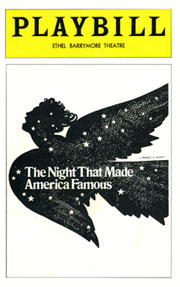 What
did you think of Harry's Broadway show, "The Night That Made America
Famous?"
What
did you think of Harry's Broadway show, "The Night That Made America
Famous?"
Oh, that was something. I remember going to the opening. The funny thing
is I was sitting with a group of Queens [New York] or New Jersey housewives
that came in busloads. They were older people and it was unfortunate because
the thing didn't work for them. They were rather bewildered by the whole
thing. What they wanted was something with a lot of dancing and a love
story.
So it kind of took the pleasure out of the evening because I was hearing
these vague rumbles around me. They weren't wowed. Usually, when I went
to shows, there were people who particularly wanted to hear him. These
were people who had been sold a show by a ticketing agency to go to an
opening or something.
What was your impression of the performance?
Well, I had gone to previews, and I knew a lot about it so it wasn't a
surprise for me. I thought it was great. I thought Harry was very interesting.
He was a different person on-stage than he was off-stage. His stage presence
was more welcoming, and at times he was quiet and not reflective. But
the stage manner was well done and realistic. He really enjoyed being
on stage.
Why did it seem he was always running?
He'd gotten
himself into too many things. He hated disappointing people. He always
did. He always wanted to be liked or helpful or something. So he got himself
into more and more things to do.
He hadn't learned to pace himself which I think you ultimately have to
do if you're going to be a star or something. You certainly do in the
opera and other things because you just can't keep up with that many things.
I mean he was doing so many benefits, and he had ideas and so much going
on. I think that's why he was always running.
Did it worry you?
I didn't see quite as much of him then. But you let people do their own
thing. It's not going to make a difference. You would express concern
but that's all you could do. But I didn't see him as much then because
he was so active and in so many places.
What drove him to get so involved in so many social
causes?
I think
when people approached him he was willing to talk to anybody anytime.
He liked people. When people asked him he got involved. Heaven knows,
even now, when I get mail at this time of year, people write to me for
contributions, and I get somewhere between 25 and 50 organizations that
sound absolutely worthwhile and it just mushrooms.
What was your reaction when he and Bill Ayres established
World Hunger Year?
I thought it was an excellent idea. It was a worthy cause and a way of
structuring the things he was trying to do. Maybe he could have one organization
instead of doing so many benefits and so many other things. Maybe it could
make it easier if it was somewhat organized.
Why was hunger so important to him of all the causes?
It's a fundamental thing. I mean there are a lot of other things people get into like gay marriage and religious things and all sorts of stuff, but hunger is such a fundamental, no-nonsense kind of thing. I mean everybody feels that no one should go hungry. Sometimes people would rather blame it on the people themselves.
But
he was so passionate about it, to the point that he rallied the Congress
and then the President to establish the Presidential Commission on World
Hunger.
I know. That was wonderful. The person who talks about that a lot is Senator
[Patrick] Leahy. We were rather poor when Harry was little, but I don't
think he was ever hungry. But he'd say hunger is an obscenity and, of
course, it is. It's ridiculous.
Where are we today in terms of hunger and poverty
versus when Harry was pushing the issue?
Well, I think the Bush administration has been a disaster. Instead of
focusing on basic needs of people, they're destroying Iraq, and then they're
going to build it up again.
Instead of doing it in a slower way to take care of people's needs, they're
blowing enormous amounts of money with what looks to me like nothing but
destruction. But that's a political thing. And even here, it seems to
me there's less interest and emphasis on fixing things here because everybody's
focused on this miserable war.
Harry would be going nuts with all this. He'd be thinking it's appalling.
How anybody could think that Bush represents righteousness is beyond me.
All of us feel that way. Apparently, a lot of America thinks differently.
It's been a great blow to me to discover how many people feel differently.
I'm more disappointed by the American people's reaction than I am in Karl
Rove. It's horrifying. It's phony stuff of righteousness. Letting people
starve is much more outrageous than the things they focus on.
We're coming up on the 20th anniversary of "We
Are the World." In 1986 at the American Music Awards, Harry
Belafonte accepted an award for the song. Belafonte cited Harry Chapin
as the inspiration for so many people and so many hunger-related projects.
What are your thoughts on that?
I heartily concur. There are other people who are doing some of these
things now, aren't there? Bruce Springsteen seems to be trying to do things.
Harry's manager Ken Kragen, one of the creators
of "We Are the World," said he really felt Harry Chapin
had crawled up inside of him and was directing the project. How does that
make you feel when you hear that?
I feel delighted and, of course, sad.
Occasionally, I'll hear somewhere "Cat's in the Cradle"
or "Taxi," and it's a shock. I'll almost burst into tears
when I hear one of his songs. But I think it's wonderful. I don't know
what he would have done had he kept living. I think he was trying to figure
out what he was going to do next. Of course, we'll never know.
Why is it that all these years later, people are
still inspired by his work?
He had that thing when he was talking to you. It was sort of one-on-one
and filled with vigor and enthusiasm. A lot of people don't do that. I
guess that's how he was able to affect people.
What was your reaction to his musical success?
I thought it was great. It was a world I didn't know much about. His father
was sort of the first jazz drummer, and that was the first time I'd known
about jazz. You're always delighted with the success of your children.
Were you worried that he might spend so much time
on the road like his dad?
Well, I thought that might be happening. But I hoped it was going to work
out. Tom has worked out a way that seems to suit him. I thought Harry
was taking on much too much, but I hoped he would realize it.
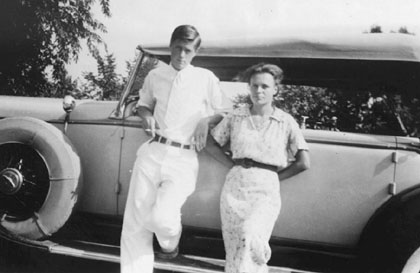
Elspeth Hart with her first husband, Jim Chapin (photo courtesy of
Josh Chapin)
What is his most enduring legacy?
That, I think, is the kind of question a mother doesn't do well on because
you think of him as a baby, as a little boy going to school. My knowledge
of Harry was his earliest 15 years.
The other years, I would go to concerts and say, 'wow, look at this.'
I can't figure out how he affected the world really at all because he
was just a part of my life. So that's the kind of question you'll have
to ask someone who's aware of sociological curves or something.
What lesson can we learn from his life?
I was so appalled that it was cut short. Personally, I think he shouldn't
have rushed around so much. He should have paid more attention to his
health and his driving and the situations he was in.
But he was thinking about larger issues most of the time rather than picayune
problems of living. It was part of his character I guess.
Watch for the Next Issue of Circle! on March 7
